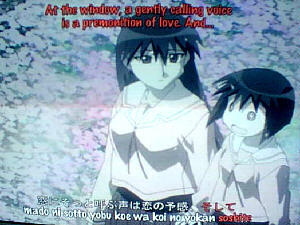Friday 4 April 2003

|
Pic of the day: An instance of koi, although it may not usually dare speak its name. Screenshot from the exit sequence to the Azumanga Daioh anime. Ai or koiI was pleased to discover that Japanese has two different words for love, ai and koi. Ai is the more general word, and the one I learned first. Koi was presented as being love between man and woman, like falling in love. This made sense, and I made a mental note to translate koi as "romance". But reading up on the topic on google.com, I found that the Japanese seem to have developed their own definition. "Koi is always wanting, ai is always giving." I stared at the screen as if looking at a revelation in holy scripture. I could practically see Japan slide upward on my list over possible places to live. (Admittedly it was quite low from the start.) How nice it must be to live in a place where everyone knows the difference between "love" and love... Of course, the two are not mutually exclusive. Ideally, needy love should always be tempered with giving love, or you will wear the other out, drain and most likely chase them away. Perhaps the best mix of ai to koi is 2:1? That's the case in the strange but haunting song "Raspbery Heaven", which is used as the exit song for each episode of Azumanga Daioh the anime. I have played it over and over again. Here is the English translation of the relevant part:
The key for love (ai) is at the future. OK, the Engrish looks strange, but the song is really beautiful at this point. Let me try some English to English translation here, even at some cost of the original meaning:
The future will open up for love: That at least made sense, although I'm not sure it is too closely related to the original Japanese text ... ***An intriguing point here is that koi, at least as a stand-alone word, seems to be limited to love between man and woman. This makes sense in most ways, for instance parental love should be ai even though parents can miss their children too. But it also means that love between two people of the same sex is always supposed to be ai, like some kind of extended friendship. Again, usually it is, I guess. But the whole literary genre of Shounen Ai – boy love – is based on the concept that boys can fall in love with boys. Surely this should have been Shounen Koi ... but the word koi seems so specialized that this would automatically have implied that it was a boy's love for a girl. Same goes for the far less common genre of shoujo ai. Even so, I cannot help but notice that at the exit sequence on the Azumanga Daioh anime, the directors has chosen to illustrate the line "At the window, a gently calling voice is a premonition of love" with a picture of Sakaki and Kaorin. And if you look at Kaorin in the picture I captured above, I think that is definitely not ai ... In fact, this picture was what made me go hunt for the relationship between koi and ai. As a bonus, I found out that Japanese usually don't use "love" as a verb. Rather, they say "I like you". Isn't that just so cute? I love cultural exchange! Well, like it at least... |
Sunny and even warmer than before. |
Yesterday <-- This month --> Tomorrow?